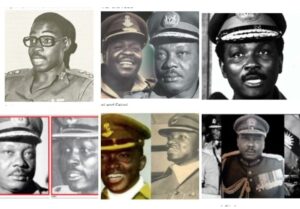
In Nigeria’s political history, the fate of two military officers – one dead, one still living – was decided by a specific date. The first officer was 41 years, 10 months when he became the Head of State.
Six months later, he was removed in a bloodbath. His predecessor was 31 years, nine months when he succeeded the former as Commander-in-Chief (known then as Supreme Commander). Nine years later, he was removed in a bloodless coup.
That is the story of the late Major-General Johnson Thomas Umunakwe (JTU) Aguiyi-Ironsi, Nigeria’s first military ruler, and his successor, General Yakubu Gowon.
In 1966, Aguiyi-Ironsi was killed. In 1975, Gowon was removed from office. But the events happened on the same date – July 29. Today, Nigerians will, once again, reflect on the drama that occurred decades ago, which led to fundamental changes in the country’s history, writes GABRIEL AKINADEWO.

In many countries, there is nothing significant or spectacular about the date – July 29. But in Nigeria, the most populous black nation, this is not so.
In the West African country, October 1 is also significant. In 1960, that was the day Nigeria got her independence from Britain.
Politically, May 29 and June 12 are also significant.
But the importance and relevance of July 29 to her political history, negatively or positively, remain unarguably obvious.
The drama of the day, 57 years ago, triggered a chain of events that led to some fundamental changes in the country’s history.
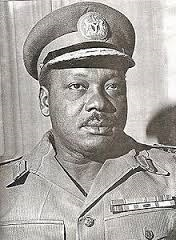
It was the day the first military Head of State, Major General Johnson Thomas Umunakwe (JTU) Aguiyi-Ironsi, was overthrown and it turned out to be the bloodiest military coup in Nigeria.

Ironically, nine years later, when the beneficiary of the July 29, 1966 coup, General Yakubu Gowon, was removed from office, it was bloodless.
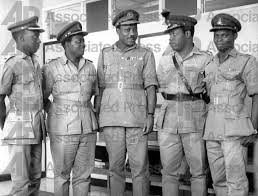
Although there was blood during the first military coup of January 15, 1966, what happened on July 29, 1966 was a bloodbath as a ‘ruthless blitz’ was carried out on southerners, mostly, Igbo officers.

It was a day that not only changed the political history of Nigeria but later restructured the geography of the nation, a day that changed the structure of the Nigerian Army, which started the process leading to the 30-month civil war when hundreds of thousands of Nigerians were killed.

The two major actors of July 29 in 1966 and 1975 were the late Aguiyi-Ironsi and Gowon.
Ironsi, popularly known as Johnny Ironside, was born on March 3, 1924 at Umuahia-Ibeku (Abia State) and enlisted in the army at 18.

As a Lieutenant, he was Aide-de-Camp (ADC) to the then Governor-General, Sir John Macpherson, became a Major in 1955, was named Equerry to the Queen on her tour of Nigeria in 1956, promoted Lieutenant-Colonel in 1960 and got his first command, the Fifth Battalion in Kano. The same year, he commanded the Nigerian contingent to the United Nations Forces in the Congo.
In 1962, he was named the Military Adviser to the Nigerian High Commission in London and later promoted a Brigadier. In 1964, he became the first African to be named the Commander of the entire UN Peace-Keeping Force in Congo with the rank of Major-General.
When he returned to the country, he became the first indigenous General Officer Commanding (G.O.C) of the Nigerian Army, succeeding a Briton, Major-General Welby-Everard.
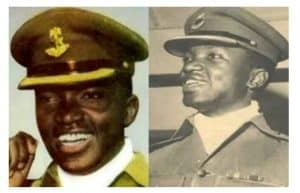
He later became Nigeria’s first military ruler after the Major Patrick Chukwuma Kaduna Nzeogwu coup on January 15, 1966.
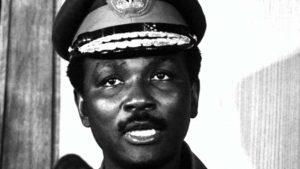
Gowon, Angas, was born on October 19, 1934 in Garam, Pankshin, Plateau State.
He enlisted into the Nigerian Army and trained in Officer Cadet Training School, Teshie, Ghana in 1954. He was the first indigenous Adjutant, Fourth Battalion, Queen’s Own Nigerian Regiment (QONR), as the Nigerian Army was known then, between 1960 and 1961 and was Brigade-Major of UN Peace-Keeping Forces, Luluabourg, Congo between January and June, 1963.
He was promoted Major in 1962, Lieutenant-Colonel in 1963, named Adjutant-General, Nigerian Army from 1963 to 1965, was Chief of Staff in January 1966, became the second military ruler on August 1, 1966, promoted Major-General in 1967 and became a four-star General in 1971.

He was 31 years, nine months when he succeeded Aguiyi-Ironsi and he is still the second longest serving Commander-in-Chief in Nigeria after General Olusegun Obasanjo who ruled for 11 years (1976-1979, 1999-2007).

Gowon ruled for nine years.
The murder of Aguiyi-Ironsi on July 29, 1966 could be traced to happenings six months earlier when Majors Patrick Chukwuma Kaduna Nzeogwu, Emmanuel Ifeajuna, Adewale Ademoyega, Donatus Okafor, Humphrey Chukwuka, Chude Sokei, Captains Timothy Onwuatuegwu, Christian Anuforo and others staged the first coup.

By the time the coupists stopped firing, many politicians and officers were dead.
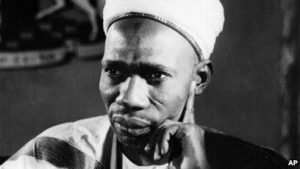


They included Prime Minister Abubakar Tafawa-Balewa; Northern Premier Ahmadu Bello; Western Premier Samuel Ladoke Akintola and Finance Minister Festus Okotie-Eboh.

Others included Brigadier Samuel Adesujo Ademulegun; Brigadier Zakariya Maimalari; Colonel Kur Mohammed; Colonel Ralph Sodeinde; Lt. Col Yakubu Pam; Lt. Col Arthur Chinyelu Unegbe and Major Samuel Adegoke, among others.
But since the leaders of the coup hailed mainly from the South, some elements in the North believed it was the beginning of the process to ‘Southernise’ Nigeria.
This was so, given the fact that in the Nigerian Army then, the leading officers were from the East.
In 1960, there were only six commissioned officers from the North in the army.
The Defence Minister then, Alhaji Ribadu, knew this scenario was not in the interest of the North. Not long after assuming office, he declared that 50 per cent of the commissioned ranks must be Northerners.
Obviously, this could not happen overnight as officers must be educated.

In military statistics then, the great majority of infantry men were from the North and 80 per cent of this majority were Tivs.
But 70 per cent of officers’ ranks were from the East. This was due to their level of education.
Indigenes of the West were better educated than their counterparts in the East and North but the educated in the West chose to go into other professions such as law, medicine, engineering, journalism, foreign service and others.
This led to the proliferation of Easterners in the officers’ ranks.
So, between 1960 and 1966, in compliance with the pronouncement of Ribadu, the North had more junior officers enlisted into the army than other zones but the senior officers’ ranks were still dominated by Easterners.
That was why the ringleaders of the July 29 coup were Northern officers of middle ranks. Despite the fact that the victims of the January putsch cut across the zones, it was believed in the North that it was an Igbo agenda to ‘Southernise’ the army.
The emergence of Aguiyi-Ironsi as the Head of State added to this fear but then, he was the most senior officer around.
Also, because of the command structure of the army, there was the need to centralise governance.

On May 24, 1966, Ironsi announced the Constitution (Suspension and Modification) Decree. This was after the Supreme Military Council (SMC) had ratified it.
The provisions involved the abolition of the regions and their conversion into groups of provinces, although with the same boundaries, governors and administrations.
Nigeria would cease to be a federation but would become the Republic of Nigeria. In reality, the Unification Decree virtually changed nothing but names. It was just an exercise to formalise governance through the command structure of the army.
The massacre that followed was unprecedented as many Igbo were killed in the North.
Aguiyi-Ironsi, to convince Northerners that he was a detribalised Nigerian, chose most of his aides from the North.
He made Gowon his Army Chief of Staff and right hand man. Mallam Hamsad Amadu, a relative of the late Ahmadu Bello, was his Private Secretary.
His personal escorts were composed mostly of Hausa soldiers commanded by a young Angas Lieutenant, Williams G. Walbe, and his Army ADC was Lieutenant Sani Bello, a Hausa.
Many attempts were made to pacify the rioters in the North to no avail. To wield the big stick would have confirmed the fear of an attempt by Igbo officers to lord it over the rest.

In July, Aguiyi-Ironsi embarked on a nationwide tour to tell the people his good intentions. He never returned to Lagos. On July 28, he was in Ibadan to open the Conference of Traditional Rulers and he was the guest of the Western Military Governor, Lt. Col. Adekunle Fajuyi.
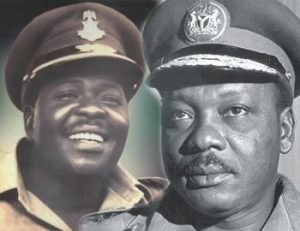
In the evening, Aguiyi-Ironsi was dining with Fajuyi at the Government House, Ibadan. With them was Colonel Hilary Njoku, the Brigade Commander, Second Brigade. A few hours later, the coup started with a mutiny in Abeokuta barracks.

A Hausa Captain led some soldiers into the officers’ mess around 11 p.m. and shot three Eastern officers – a Lt. Col, a Major and a Lieutenant. The armoury was seized. Southern officers and senior non-commissioned officers were rounded up and shot around 5 a.m. on July 29. Same happened at the Second Battalion in Ikeja and Fourth Battalion in Ibadan.
When Aguiyi-Ironsi heard about the mutiny, he dispatched Njoku to Ikeja to counter it but Njoku was lucky to have escaped as he was shot and wounded on his way. The Ibadan end of the mutiny was coordinated by Major Theophilus Danjuma, with assistance coming from Majors Adamu Martins and Murtala Muhammed.
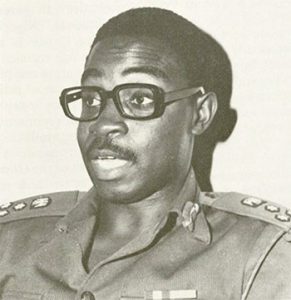
Earlier, in a deft move, Aguiyi-Ironsi’s southern bodyguards were disarmed by their Northern counterparts led by the Adjutant, Second Lieutenant Garba Paiko.
The death squad was later strengthened by an extra 30 troops led by Danjuma from the Fourth Battalion in Ibadan.
The battalion was under the command of Colonel J. Akahan, a Tiv, from the North.
Akahan later became Gowon’s Army Chief of Staff. He died in a helicopter crash during the civil war.
When the Danjuma team arrived the Government House, the detained Southern bodyguards of Aguiyi-Ironsi were shot.
Aguiyi-Ironsi sent his Air Force ADC, Lt. Nwankwo, to find out what was going on. He was arrested by the Danjuma group. The Head of State and Fajuyi were eventually arrested. The duo and Nwankwo were tortured and taken to a bush part on the road leading to Oyo town.
Nwankwo was younger than Aguiyi-Ironsi and Fajuyi. Although tortured badly, he seized the opportunity of a lapse and escaped into the bush. Aguiyi-Ironsi and Fajuyi did not have the strength to do this. Magazines of Sten guns were emptied into them. The police later found their bodies and buried them at the Ibadan cemetery.
Six months later, the bodies were taken to their respective home towns for military burial.
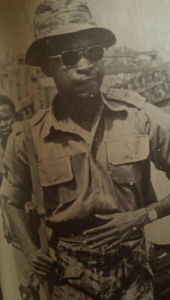
But in an interview with the Sunday Guardian on February 17, 2008, Danjuma exonerated himself from the killings.
He said: “What happened was that after we arrested him (Ironsi), I lost control. Remember that I was a complete stranger. I came from Lagos with Ironsi as a staff in the Army Headquarters attached to him. I stayed in the barracks with the Adjutant (the Chief of Staff of the Commanding Officer). I stayed with him in his single officer quarters. And it was there, at one or two o’clock in the morning – I was in bed – when he came and knocked at my door. He said, “Sir, do you know what has happened?” I said, “No”.
“He said there was trouble in Abeokuta, an Igbo officer holding a secret meeting with all the Igbo officers in the officers’ mess and our boys (Hausa soldiers) went and shot all of them”.
“I asked the Adjutant, who was in a position to know, if the Supreme Commander – at that time Ironsi was known as Supreme Commander – had been told. He said, no; he didn’t think so. I said okay; he should get me some soldiers. He brought soldiers. I didn’t come to Ibadan with combat dress.
“I had to borrow the combat dress of an officer about my size. It was an American combat dress. This officer had just come back from the U.S. You know, when you travel with the Head of State, you have to dress decently, wear service dress and so on.
“So, I borrowed fatigue, wore it. In fact, I wore it over my pyjamas and left with the Adjutant. I said, “take me to Government House”. We got there. We asked soldiers who were on duty to ground arms. They all grounded their arms. I told the Adjutant what to do. Soldiers grounded their arms; we disarmed them and armed the soldiers that we brought.
“Meanwhile, the anti-tank gun (with Ironsi’s convoy) was there, the commander was there. The commander was from the garrison in Ibadan. We knew him; we told him. He said we should use the gun to blow down the building. I said no. There’s no need; the Head of State was there; we had to arrest him.

“We were there and waited. Any time anybody came out from the building, we arrested him. They removed their shoes and we asked them to sit down. We wanted to arrest him (Ironsi) alive and go and lock him up.
“We wanted to interrogate him, to find out the role he played in the coup (January 1966); his stories didn’t add up about how he escaped from Flagstaff House where he was staying at No.1, Glover (Ikoyi), and ended up in Ikeja.
“How it came about that Njoku, who was supposed to have handed over the command of the largest garrison in Lagos, which was then the Ikeja Garrison, did not hand over. Njoku was still in command and he (Ironsi) went to join him. We were going to interrogate him about all those, or at least, that was what I thought we were going to do.
“Everything I told the soldiers to do or not to do, they obeyed. (Adekunle) Fajuyi (Military Governor of Western Region) came out of the building. As he came down the steps, I saluted him and said: “Sir, you are under arrest; hands up’

“He looked at me and called me, “Danjuma?” I said, “Sir, you are under arrest”. He raised his hands and came down. He asked: “What do you want?” I said: “We want to arrest you and we want to arrest the Head of State.” He asked: “And you are going out with him?” I said, “yes”. “He (Fajuyi) pleaded with me not to go up with armed men, that he was going to go up and call him (Ironsi) provided I guaranteed his safety.
“I gave him my guarantee. I said: “I guarantee your safety.” He went there, and didn’t come down. So, I decided to climb up. As I climbed up the steps, armed soldiers followed me. I had a grenade in my hand. I didn’t have any arm. As I came, Ironsi was seated. Fajuyi was by his side. I said: “Sir, you are under arrest.” And I gave him the order to stand up.
“Reluctantly, Ironsi stood up. He used to carry a staff crocodile. He had it in his hand. They both came down. Fajuyi was still asking me about guaranteeing safety. I guaranteed his safety absolutely. So, we came out of the building down toward the car.
“One of the soldiers said we shouldn’t allow him to carry his crocodile, that there’s juju in it. I said no; there’s nothing in it. He said he’d disappear if we allowed him to carry it. He started to talk and I told him to shut up. That was the time I lost control. The soldier batoned me and pushed me aside and took charge.
“To my greatest surprise, I expected the Adjutant, who was there, to intervene. He probably incited them. He said, “Yes, the soldier is right. This thing here (Ironsi’s crocodile) is his Zasa; it’s juju that will make him disappear.
“So, they took the thing from him, pushed me aside and bundled him and Fajuyi in a vehicle and drove away. It was six o’clock in the morning. I had to hitch a ride to go to the barracks. They left.
“There was no vehicle even for me to leave that place; they just drove away, taking them away. So, I had to make my way back to the barracks. If you read Gowon’s book, it’s there. They named names of the people who actually took Ironsi away”.

About 50 Southern officers and more than a hundred other ranks were shot on July 29, 1966 in many barracks.
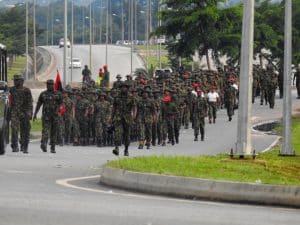
Some of them were Lt. Col I.C. Okoro, Lt. Col. Gabriel Okunweze, Major Theophilus E. Nzegwu, Major Bernard Nnamani, Major Christopher Chukwunuike Emelifonwu, Major John Ikechukwu Obienu, Major Ibanga Ekerem, Major Peter C. Obi, Major Alister Drummond, Major Ayodele Ogunro, Major O.U. Isong and Captain P.C. Okoye.
Also, two of the officers who planned the January 15 coup, Okafor and Anuforo, detained in the West, were brought out of their cells and murdered.
Initially, feelers coming from the North indicated secession of the region from the country. So, between July 29 and 31, other regions were preparing for the secession.
But on Monday morning, August 1, the then British High Commissioner, Sir Francis Cumming-Bruce, sought an audience with Gowon.
For six hours, he told Gowon the consequences of Northerners’ plan to secede.

When later in the day, Gowon made a broadcast that he had been brought to the position of “having to shoulder the great responsibilities of this country and the armed forces with the consent of the majority of the members of the Supreme Military Council,” the Military Governor of Eastern Region, the late Lt. Col. Chukwuemeka Odumegwu-Ojukwu, protested.
To him, there was no full meeting of the SMC, of which he (Ojukwu) was a member, which selected Gowon as the new Head of State.
Also, he believed that since the death of Aguiyi-Ironsi had not been confirmed and announced officially, there was no vacancy for the post of Commander-in-Chief.
Ojukwu’s most potent reason was that Gowon was not the most senior officer in the country then.
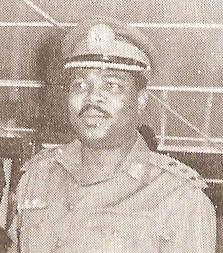

To Ojukwu, if there was going to be a change in the leadership structure, Ironsi’s second in command, Brigadier Babafemi Ogundipe, must take the baton. If not, Colonel Adeyinka Adebayo, Rear Admiral Wey, Colonels Imo, Effiong and Njoku, senior to Gowon, must be considered.
So, Ojukwu believed Gowon was not rightfully entitled to the headship of the government. But the Northerners refused to take orders from these senior officers except Gowon.
In fact, a Northern sergeant (a non-commissioned officer) had told Ogundipe off, a serious offence in the military.

The impasse eventually led to the civil war between July 6, 1967 and January 15, 1970.
Nine years after the coup that removed Aguiyi-Ironsi from power, Gowon himself was thrown out and what led to his removal on July 29, 1975 could be traced to events after the civil war when he started personalising state matters.
In short, his administration became a byword for corruption and 10 of the 12 governors under him had to be dismissed by his successor, the late General Murtala Muhammed.

On October 1, 1974, Gowon dismissed as unrealistic the 1976 deadline for a return to civilian rule.
When Nigerians started losing confidence in the government, Gowon’s relation, who was the head of the Brigade of Guards, Colonel Joseph Nanven Garba, Colonels Shehu Musa Yar’ Adua and Abdullahi Mohammed, planned his ouster.
They sought and got the support of some senior officers. Gowon himself had the feeling that something was in the offing.
When he was going to Kampala, Uganda on July 27 to attend the Organisation of African Unity (OAU) summit, he asked Garba at the Lagos Airport whether a coup was indeed in the offing.
‘No’, replied Garba.

At 6 a.m. on July 29, 1975, Garba announced that Gowon had been ousted from power.
The coup took place on the ninth anniversary of the one which resulted in the death of Aguiyi-Ironsi and others, and which, brought Gowon to power.
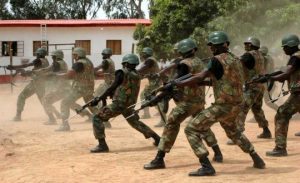
From Kampala, Gowon went to Lome, Togo briefly to stay with the late Gnassingbe Eyadema before going to Britain on exile.
Source : Freedom Online










